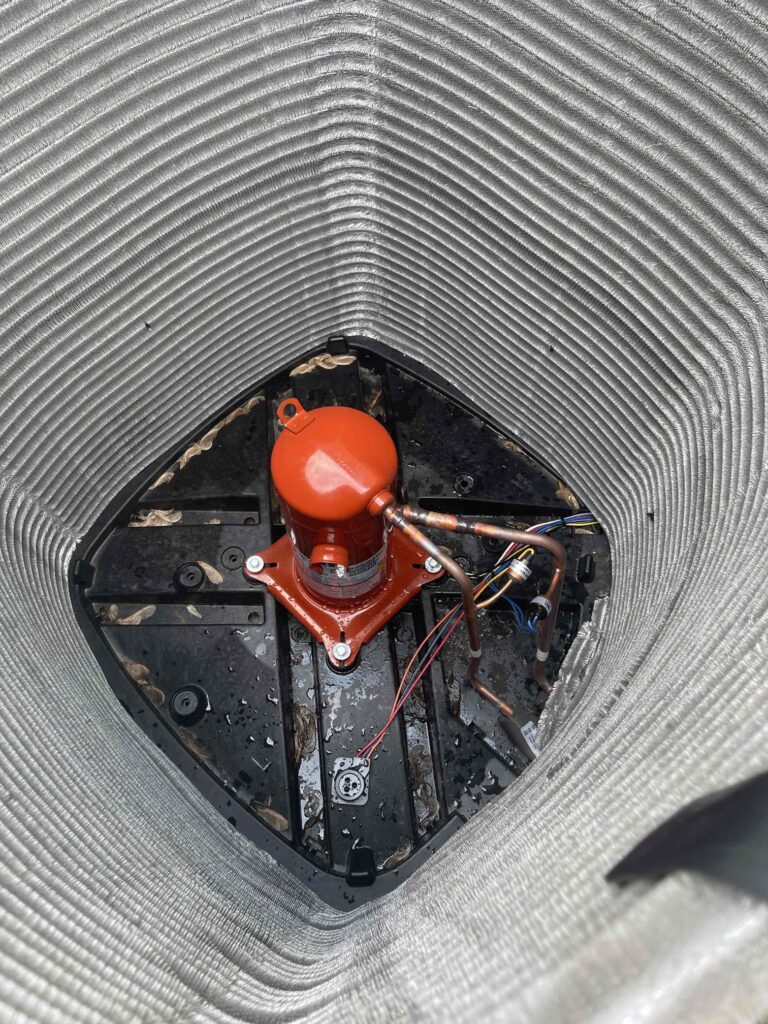An air conditioner is an invaluable ally in keeping your home cool and comfortable. The AC compressor plays a crucial role in the cooling process.
However, like any mechanical component, the compressor can encounter issues over time. Recognizing the warning signs of a failing ac compressor is essential to avoid costly repairs and ensure your system continues functioning efficiently. Additionally, we will provide guidance on diagnosing and addressing issues, as well as preventative measures. If you want to ensure your home stays cool and comfortable, keep reading!
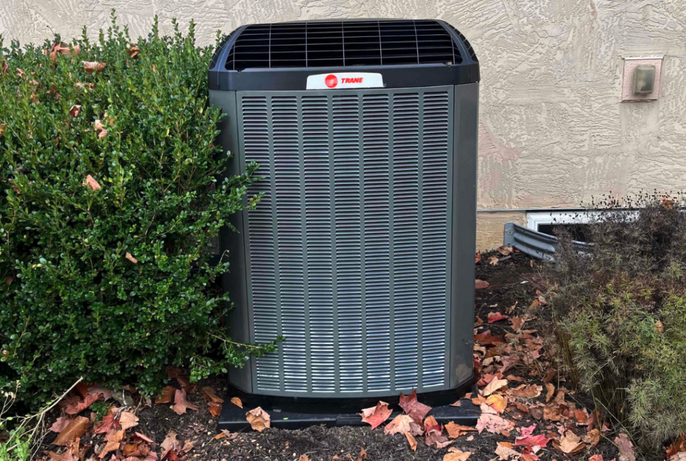
The Essential Role of AC Compressor Systems
When it comes to keeping our homes cool during the sweltering summer months, air conditioners play crucial roles. At the heart of this essential system is the AC compressor.
Basic Function of AC Compressors
The AC compressor serves as the central component responsible for circulating and pressurizing the refrigerant in your air conditioner.
Think of an air conditioner as a large-scale heat transfer device, with the compressor acting as the workhorse that ensures smooth and effective flow of the refrigerant throughout the system. Without a properly functioning compressor, your air conditioning system would fail to generate cool air, leading to considerable discomfort during hot weather.
Additionally, strange noises like clanking or grinding emanating from the AC unit are telltale signs of a malfunctioning compressor. In such cases, it is highly advisable to consult an HVAC professional for an accurate diagnosis and prompt repair.
Key Components of the AC System
While the AC compressor is vital, it’s just one piece of the larger cooling puzzle. Other key components include the evaporator, condenser, expansion valve, and refrigerant lines.
The evaporator absorbs indoor heat, cooling the air as refrigerant passes through its coils with the compressor’s help. The condenser releases absorbed heat outside the cooled space. The expansion valve precisely controls refrigerant flow into the evaporator. Refrigerant lines connect all components, enabling circulation.
To ensure peak performance and energy efficiency, harmonious operation of all components is essential. Regular maintenance and timely repairs keep the AC system running smoothly.
Understanding the Refrigeration Cycle
To grasp the AC compressor’s significance, understanding the refrigeration cycle is vital. This continuous process extracts heat from indoors and releases it outside.
The cycle begins with the compressor, transforming low-pressure refrigerant gas into high-pressure. This gas goes to the condenser, releasing heat to the surroundings. As the refrigerant cools and condenses into liquid, it enters the expansion valve and reduces pressure, enabling evaporation and absorbing indoor heat as it passes through the evaporator coil. Then it goes back to the compressor to restart the cycle.
Compressor failure or low refrigerant disrupts the cycle and hampers cooling performance.
Common Signs of a Bad Air Conditioner Compressor
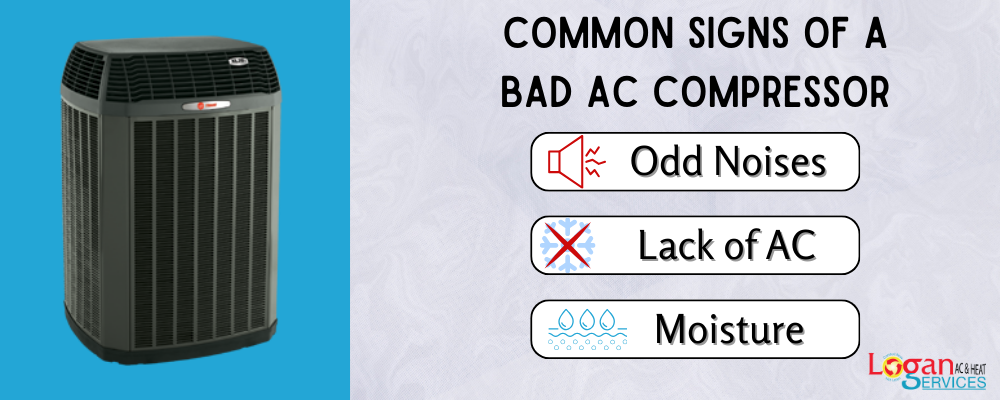
Odd Noises
If you notice peculiar sounds emanating from your air conditioning unit, it may signal a problematic AC compressor system.
Common noises associated with a faulty compressor include grinding, squealing, or rattling sounds. They often point to the presence of mechanical problems, such as worn-out bearings, loose components, or a failing motor.
If you encounter any of these atypical noises, contact an HVAC expert promptly to diagnose and rectify the problem.
AC Not Cooling Properly
The ac compressor plays a pivotal role, compressing refrigerant gas into high pressure, enabling cool air circulation. Ineffective cooling may indicate a compressor issue. Malfunctioning compressors result in reduced cooling and discomfort.
Underlying causes of compressor failure include low refrigerant, dirty condenser coil, or faulty AC relay switch. Engage an HVAC technician for accurate diagnosis and repairs to restore system functionality.
Leakage and Moisture Issues
If you detect any leaks or excessive moisture around your AC unit, it may indicate a problematic AC compressor system. Since the compressor operates at high pressure, any leaks in the system can lead to refrigerant escaping.
Refrigerant leaks not only harm the environment but also significantly impact your air conditioner’s overall performance.
Should you suspect any leaks in refrigerant or have concerns about moisture,, promptly inspected and repaired by an AC professional.
The Impact of Bad AC Compressor Systems
Reduced Energy Efficiency
A significant consequence of a malfunctioning air conditioning compressor system is reduced energy efficiency. The air conditioning unit heavily relies on the compressor to cool down the air. However, a faulty compressor places additional strain on the entire system. The air conditioner might struggle to reach the desired temperature, forcing it to work harder and longer.
As a result, the unit will consume more energy, so you may see higher electricity bills and unnecessary energy wastage.
Impact on Indoor Comfort and Health
A bad AC compressor can profoundly affect indoor comfort and health. When the compressor isn’t operating properly, it may struggle to generate sufficient cool air, leading to inadequate cooling and discomfort, particularly during hot summer days.
A compressor problem can also impact your health. A poorly functioning air conditioner isn’t removing humidity from the air. These allergens can trigger respiratory problems and allergies, posing potential health risks.
Cost of Repairs and Replacements
Dealing with a faulty AC compressor can be financially burdensome. If you suspect compressor issues in your air conditioner, it’s wise to schedule an inspection by an HVAC professional. They can diagnose the problem and suggest the best course of action.
In some cases, repairing the compressor might be feasible, but it can still be quite costly. However, if the damage is severe or irreparable, a complete replacement becomes necessary. Replacing an air conditioner compressor is a significant investment that requires professional installation.
To prevent major compressor failures and reduce long-term expenses, regular maintenance and timely repairs of minor issues are essential.
Diagnosing and Addressing Bad AC Compressor Systems
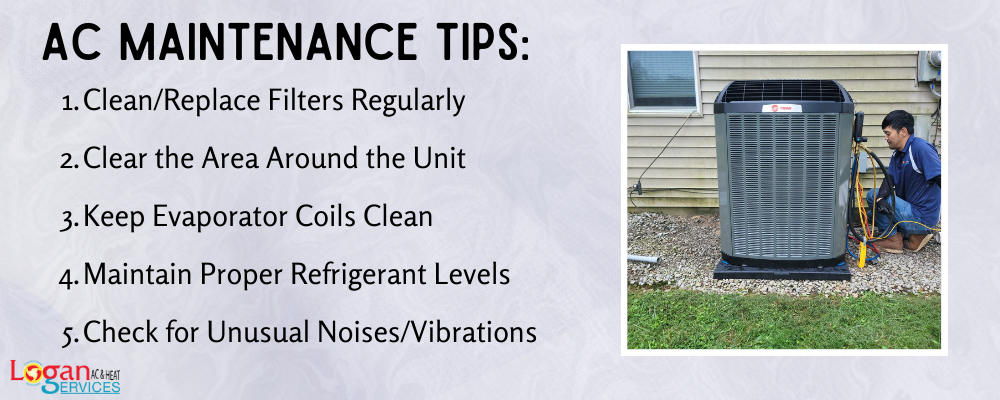
Role of Regular Maintenance
Regular maintenance plays a pivotal role in ensuring the long-lasting and optimal performance of your air conditioning system. By scheduling regular maintenance checks with an HVAC expert, you can identify potential ac compressor problems before they escalate.
The technician will be on the lookout for signs of wear and tear, refrigerant leaks, or mechanical failures.
Additionally, regular maintenance involves cleaning or replacing air filters, enhancing the overall efficiency of your AC system. Clogged or dirty air filters can strain the compressor, potentially leading to issues. Changing and cleaning filters ensures the smooth functioning of your air conditioning system and extend its lifespan.
Importance of Timely Repair
Promptly addressing signs of trouble with your air conditioner is crucial to prevent further damage and costly repairs, or even the need for a complete replacement. Common signs of a failing compressor include:
- Unusual noises from your AC unit
- The compressor not engaging or kicking on
- High-pressure or low-pressure readings
- Inconsistent cooling or lack of cool air
- Frequent circuit breaker trips
If you encounter any of these issues, contact an HVAC professional promptly. They will diagnose and address the problem, determining if the compressor is the root cause or if other issues are at play.
The Decision to Repair or Replace
After diagnosing a damaged air compressor, you’ll face the choice of repairing or replacing it. Consider the age of your system, repair cost, and overall condition. Minor repairs might suffice for newer systems, but older ones may benefit from a full compressor or AC unit replacement if repair costs are high.
An HVAC expert can advise based on your situation, considering newer models’ efficiency, potential energy savings, and your current air conditioning system’s projected lifespan.
Remember, DIY repairs may be dangerous and void warranties. Always rely on a qualified HVAC technician.
Preventative Measures to Avoid Bad AC Compressor Systems
To ensure your air conditioning system continues to function properly, it’s vital to take preventive measures before minor issues turn into serious and costly damage.
Best Practices for AC Maintenance
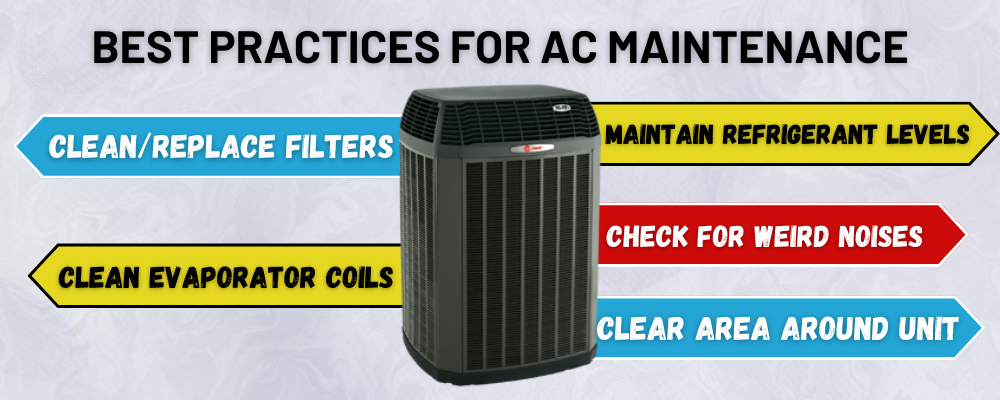
Regular maintenance is crucial to keep your air conditioning unit in optimal condition and prevent air compressor failure. Follow these best practices:
- Clean or replace air filters regularly: Clogged filters restrict airflow, straining the compressor. Clean or replace filters every 1-2 months for proper airflow.
- Clear the area around the outdoor unit: Remove debris and vegetation obstructing airflow around the outdoor AC unit. Good airflow is vital for efficient AC operation.
- Keep evaporator coils clean: Dust and dirt reduce coil efficiency and affect the compressor’s performance. Regularly clean coils to prevent compressor strain.
- Maintain proper refrigerant levels: Insufficient refrigerant makes the compressor work harder, leading to overheating and failure. Schedule HVAC check-ups for optimal refrigerant levels.
- Check for unusual noises or vibrations: Unusual sounds or vibrations may signal compressor issues. Contact an HVAC expert to diagnose and address any concerns promptly.
Lifespan of an AC Compressor System and Replacement
The average lifespan of an AC compressor system varies based on unit quality, maintenance, and usage. Typically, it lasts 10 to 15 years, but regular maintenance can extend its life.
For units beyond repair or nearing the end of their lifespan, replacement may be necessary. Consult an HVAC expert to select the right system, ensuring efficient cooling, cost savings, and increased energy efficiency.

